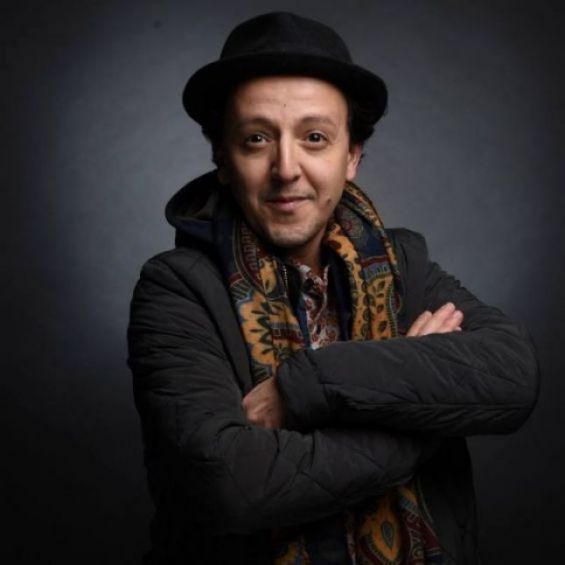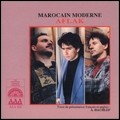«There are two kinds of cinemas; one that refutes prejudices and another one that studies human situations it wants to evoke». This is the vision of Mohamed Ouachen on the situation of artists with an immigrant background in Belgium. Born in Charleroi, Ouachen grew up in a family with two brothers and four sisters. He knew what it felt for young talents from the country’s popular districts.
Mohamed Ouachen is indeed himself someone who knows the feeling as this theater enthusiast has made his way into the field since the 1980s, when this question was a source of debates and controversies.
More than twenty years later, he makes this statement without giving in to defeatism, especially since he has contributed to the creation of a real artistic dynamic in Brussels, in response to these tensions that were felt even in institutions.
Art as the answer to identity tensions
Not at all from a family of artists, Mohamed Ouachen discovered a vocation for drama while in high school. «With a friend, I participated in a theater workshop and I really took a liking to it. The next year, I enrolled in theater classes at the Brussels Academy», he recalls. The Moroccan-Belgian artist from then on spends his career rubbing shoulders with the greatest Belgian directors.

In 1994, he took a turn towards the film industry and made his first short film, «Saïd». «This film tells the story of a Moroccan who came to Belgium in the 1990s, at the invitation of his cousins. I explain the contrasts between Moroccans on both sides by breaking the prejudices against nationals coming from the country. Contrary to the stereotypes, Saïd was a graduate and mastered French, while his relatives in Brussels were heavily influenced by their culture of origin», he tells Yabiladi.
This story is strongly inspired from the experience of its director. «When I was going on holiday to Morocco in my parents' area, near Imintanout, or elsewhere like in Casablanca, I used to meet young people who were highly literate and with a high level of education which is why I tried to deconstruct the common misconceptions claiming that immigrants to Brussels would be poorly educated», Mohamed Ouachen explains.
Quickly recognized, this work was rewarded in 1997 with the first National Short Film Award. Soon after, Mohamed Ouachen was introduced to Brussels-based troupe Babylone, for which he became a videographer. «While I was working on one of his shows, the director asked me to play a role. This is the first piece produced in a professional setting in which I received my first salary as an actor and since then, the team has started to hire me for important roles», he said proudly.
A notoriety that goes beyond the borders
From the 1990s on, Mohamed Ouachen gained media and artistic visibility. «I worked in the big theaters between Belgium and France, collaborated with director David Strosberg, comedian Fellag and other artists of the prestigious Académie française. But within these spheres, I have not seen many people from my background», the artist said.
When he met artists born in the projects, Mohamed Ouachen realized how difficult it is for many talented immigrants to be able to perform with major cultural institutions or take part into major endeavors. «This is an observation that applies both to the Belgian cultural scene and the public sphere, where few people are issued from diversity backgrounds», he said regretfully.
«As I had the chance to do so, I wanted to create a platform bringing together authors of the Brussels artistic life and immigrant cultural figures who were not very famous, from thence was 'Diversity on stage' born».
Nominated in 2011 for the best solo stage in Brussels, Mohamed Ouachen took advantage of his notoriety to set up the associative cultural structure «Diversity on stage», in order to break a glass ceiling that «remains very present». The artist is sometimes contacted by his colleagues from working-class neighborhoods who find it hard to get on stage. He introduces their work to these structures, while conducting workshops, training sessions, coaching and projects with them, acting as a link between them and the scene.
A bridge connecting Morocco and Belgium
The other «contradiction of cultural institutions», according to Ouachen, is the fact that they would express the will to take good actors from the diversity, but that they would often propose stereotypical roles and prevailing ideas about their environment.

Indeed, these artists would be called for roles related to terrorism, bag-snatchers or misogynist husbands for instance. «These are roles that I have never accepted», explains the artist, for whom it is important for the actors to know how to put themselves in the shoes of any role and not only the one who likens them to clichés about their origins.
To him, «there has never been this many casting proposals for actors with an immigrant background as today, but it is not for good reasons».
On the other side of the Mediterranean, Mohamed Ouachen is doing the same work. His goal is to give visibility to Moroccan artists in Belgium, as with the actor Jamal Laababsi committed to such projects in Brussels. «With other young people, we were able to conduct master classes, but this process is informal because it is not politically-motivated», he added.
«Rather than focusing solely on the money of Moroccans living abroad, let's look at the constant cultural bridges that can link them to Moroccans in the homeland, beside one-off events on repetitive themes».
In this sense, Mohamed Ouachen co-produced series highlighting Moroccans in Belgium, collaborating with Moroccan-Belgian Ismael Essaïdi. «In the same way, I proposed a project to the Moroccan televisions to widen the productions and to address them to Moroccans the world over, with representation quotas for Moroccan artists living abroad on national TV», he recalled.
The process was unfortunately not followed-up properly. «I introduced a draft Moroccan-Belgian police series to 2M, which was receptive but was not followed through. The same goes for the Mohammed V National Theater».
In Belgium, Mohamed Ouachen is preparing the General assemblies of Diversity scheduled for October 2020. He aims to propose a general overview of diversity on the cultural scene, fifteen years after the debate was first put forward. «Instead of listening to politicians, the idea will be to make artists, cultural and associative actors and researchers talk about their work during all these years, in a pedagogical approach that will result in proposals to the relevant concerned institutions».





 chargement...
chargement...













